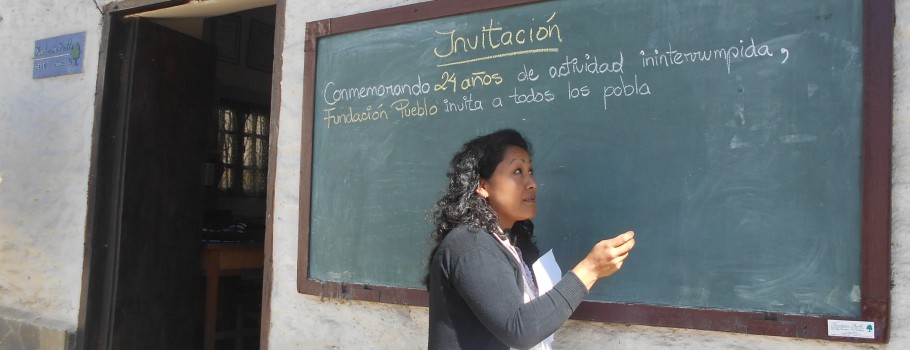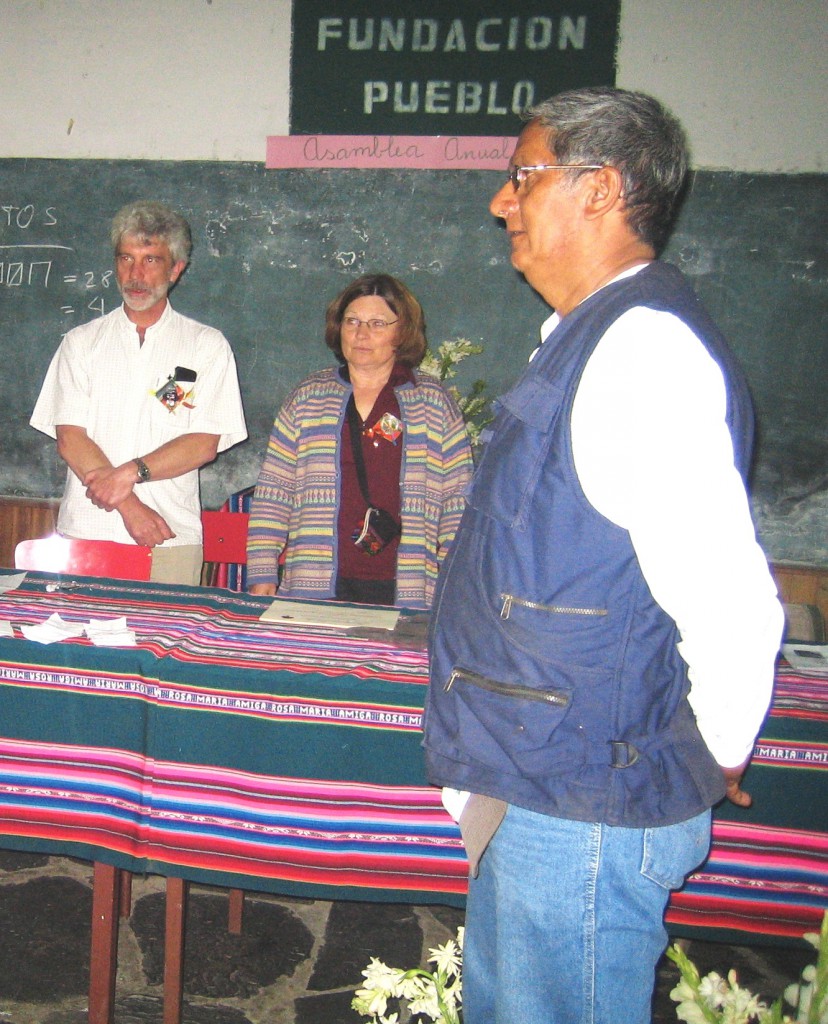
The Fundación Pueblo (translation The Village Foundation) was founded on 18 February 1991 in the Bolivian Andean village Yanacachi. This is one of the historic district capitals of the province of the South Yungas in the Andean valleys of La Paz. The Bolivian government recognised the Fundación Pueblo as a charity in 1992, with the Presidential Decree no. 210445. It was registered as a legal entity in 2013 in accordance with the law no. 351, also in the new Bolivian government.
The charity is denominationally and politically independent. This was firmly anchored in the statutes.
No Rockefeller Foundation
At the beginning the founders’ assets consisted of two small buildings in Yanacachi – a house on the village square, which to this day still serves as the village service office; and ‘the House of the Teacher’, which was able to fulfil different social functions in the village during the Foundation history. Thanks to the commitment of friends and supporters a multi-storey house in El Alto was added a few years ago, it is situated just outside the city of La Paz and is used as an inn and a meeting centre for women from the countryside. The funds for the implementation of programs and projects come from ongoing donations and special contributions from the founders, friends and partner organisations of Fundación Pueblo.
Transparency and participation
The board of the Foundation is made up of the two founding members – Günther Schulz-Heiss and Barbara Heiss and a representative of the district of Yanacachi. In accordance with the Statutes this representative will always be elected by the residents of the home district of Fundación Pueblo from their midst. The Executive Director, who is responsible for the foundation’s daily work, is also appointed for a term of two years by the board. He submits annual plans to the Executive Board and reports on their implementation.
To ensure the participation of the target groups, the transparency and the ‘grounding’ of the Foundation, every year a public meeting of the Fundación Pueblo takes place in Yanacachi. All employees of the foundation are then accountable for the project’s activities in the previous year and accept proposals for new initiatives. This procedure is enshrined in the statutes and is rather unusual for non-governmental organisations.
Recognition on both sides
On the walls of the Foundation offices in Yanacachi hang many letters and certificates from our target groups, partner organisations and community representatives, which reflect the 20 years of continuous work in the field. Regular reporting in the Bolivian media attests to the recognition of the Foundation’s work in Bolivia.
In 2007 the Regional Organisation of the United Nations Foundation CEPAL awarded the project ‘Access to Primary Schooling, Students in host families’ citing it as one of the best social innovations in Latin America (see PDF or UNICEF, in Spanish). In 2014 Germany’s Federal President Gauck honoured the founders of the Foundation with the Federal Cross of Merit for their commitment to civil society. (Here is a relating article from the Newsletter of the Germany embassy in La Paz)
Founding members and board
The Fundación Pueblo was founded by two German nationals, Barbara Heiss and Günther Schulz-Heiss. The special education teacher and economist came to know and love the country and its people over several years of work stays. They supported self-help institutions in Yanacachi – parent groups, women’s associations, farming communities and encouraged community development.
These initiatives, which similarly motivated friends in Bolivia and Germany combined, resulted in the 1991 acquisition of two simple houses in the village centre, which as a sign of the durability of the commitment, were transferred to a new Bolivian legal entity – Fundación Pueblo.
The commitment of the Foundation’s founders is to this day honorary. In 2014 the Federal Cross of Merit was awarded by Germany’s Federal President Gauck.
The representative of the district of Yanacachi is currently, also honorary, Reynaldo Uría, who has for decades campaigned for the development of his home district and who has already more than once won the confidence of the General Assembly of the Fundación Pueblo. He ensures participation and ‘grounding’ at board level of the Foundation Pueblo of the target groups and is an important guarantee of the transparency of the Foundation’s work.

The foundation’s executive board in the anual general assembly in Yanacachi (from the left: Günther Schulz-Heiss, Barbara Heiss, Reynaldo Uria)



